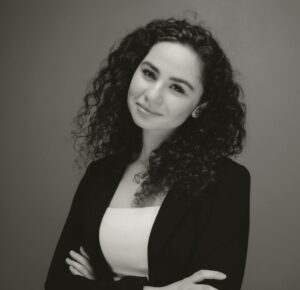By: Baylee Materia
Laura Crook arrived at UNC-CH as a pre-med student with a passion for English on the side. She never would have imagined, her freshman year, that four years later she would be combining her distinctive academic interests in pursuit of a master’s degree through UNC’s BA/MA program in Literature, Medicine, and Culture.
During her undergraduate years, Laura double-majored in biology and English. She found herself equally enamored with genetics and molecular biology as she was by the classic novels she read in her literature classes. Each discipline offered its own respective challenges: the rigor of her STEM courses built her analytical thinking skills, while her English classes transformed her into a strong writer.
It was not until her junior year, however, that she discovered a way to merge these two interests through her Medicine, Literature, and Culture class. Taught by HHIVE Lab founder and co-director Jane Thrailkill, this course aims to approach medicine with a greater sense of humility. Despite the covid-era chaos, Laura found herself “excited to wake up for [her] 8am virtual lectures.” From here, she fell down the health humanities rabbit hole, taking every course she possibly could within the discipline. With her undergraduate career winding down, Laura was not ready for her English studies to end. Thus, she entered the new BA/MA dual degree program, opting for an extra year to earn her Master’s in English.
Laura is particularly interested in fields and studies pertaining to pregnancy and childbirth. During her senior year, she completed an honors thesis studying false pregnancy in early modern England. As a graduate student, she has expanded her pregnancy research into the contemporary setting, aiming to understand how birthing people speak about their labor and parenting experiences in the COVID-19 era. For about a year now, Laura has also donated her time to birthing individuals as a doula at UNC Hospitals. After completing her dual degree, she plans on attending medical school and eventually specializing in obstetrics and gynecology.
Laura is loving her time in the BA/MA program thus far. She appreciates the degree of flexibility that the program provides: with medical anthropology, Spanish, and medical school courses on her schedule, she is eagerly capitalizing on the interdisciplinary nature of the curriculum. She also speaks highly of the HHIVE lab, remarking on how it fosters a “closeness between undergraduates, graduate students, and faculty in a way [she has] never seen before.” Greenlaw 524 has become a space of comfort, learning, and opportunity for her. She has even discovered various research projects through HHIVE in which she cannot wait to be involved.

As an undergraduate student on a path similar to Laura’s, I was eager to hear her advice for those following in her unique footsteps. “Find the things that excite you!,” she told me with a smile on her face. Acknowledging the unorthodoxy of combining English and STEM curriculums, she urges me to stand firmly against the naysayers who do not understand how the two go hand-in-hand. She encourages undergraduates to be active members of the HHIVE lab, make connections with the HHIVE faculty, and join projects that excite them. “Everyone in the HHIVE lab wants you to have the tools for success,” she explains. Finally, for those considering the BA/MA program, her advice is simple: “do it!” She has never regretted her decision for a second.
 Baylee Materia is a sophomore studying neuroscience and pre-med. When she made the decision to enter college as a STEM major, she assumed that she would have to toss her love of humanities aside. Discovering the HHIVE lab taught her not only that she can merge these seemingly contrasting passions of hers, but that an interdisciplinary approach is essential in a pre-medical curriculum. The job of a physician goes beyond the concrete science and technical intellect; one must be emotionally intelligent and able to understand the complex socioeconomic and cultural determinants of health. With a background in the health humanities, Baylee hopes to become a member of a new generation of healthcare professionals that approaches their work with a more nuanced and compassionate perspective.
Baylee Materia is a sophomore studying neuroscience and pre-med. When she made the decision to enter college as a STEM major, she assumed that she would have to toss her love of humanities aside. Discovering the HHIVE lab taught her not only that she can merge these seemingly contrasting passions of hers, but that an interdisciplinary approach is essential in a pre-medical curriculum. The job of a physician goes beyond the concrete science and technical intellect; one must be emotionally intelligent and able to understand the complex socioeconomic and cultural determinants of health. With a background in the health humanities, Baylee hopes to become a member of a new generation of healthcare professionals that approaches their work with a more nuanced and compassionate perspective.


